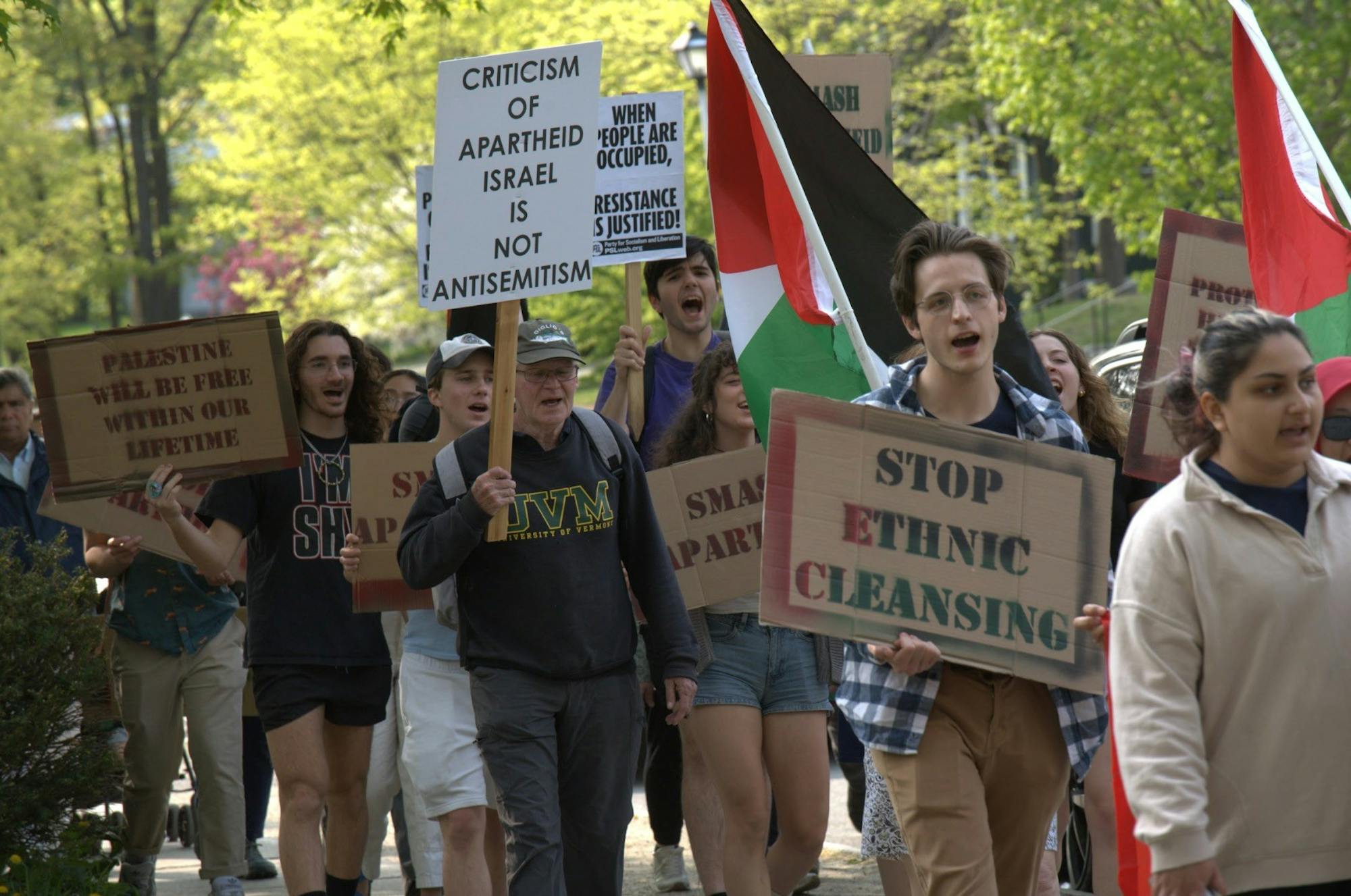On May 15, approximately 70 students, staff and community members participated in a protest organized by the Palestine Solidarity Coalition of Dartmouth College to raise awareness for the 75th anniversary of the Nakba, the displacement of the majority of Palestinian Arabs in 1948.
The protest, which lasted approximately 90 minutes, started in front of President Hanlon’s house, proceeded around Baker-Berry Library and ended on the Green, where students and community members gave speeches about the historical and ongoing persecution of Palestinians and the reasons behind their support for the Palestinian movement.
According to PSC president and event organizer Ramsey Alsheikh ’26, the Nakba occurred when 750,000 Palestinians were “forcefully expelled” from their homes. The Nakba was the “ethnic cleansing” of the Palestinian people “in order to build and establish a country with different cultures, values, and principles in place of an already existing one,” PSC member Amen Salha ’26 said.
“We’re still struggling with the [Nakba] today,” Salha said. “[The Nakba] is really an untold story.”
The protest is the last in a series of events — including a screening of the movie “Farha” at the Hopkins Center for the Arts and a speech given by Israeli American activist and anti-Zionist Miko Peled — that the PSC has organized this week to remember and raise awareness surrounding the Nakba, Salha said.
According to Salha, the PSC had been planning the protest for about two weeks, which mainly involved reaching out to organizations and making signs. However, he said that the speeches themselves were “almost ad-libbing.”
“We never sat down and coordinated who was going to speak,” Salha said. “It was genuine stories being told with genuine perspectives in a way that we don't often see.”
Some of the speakers shared personal stories of how they were forced out of Palestine. Salaam Odeh, a Manchester resident who is originally from Nablus, Palestine, spoke of her experience with the strict Palestinian border control.
“If I did not have an American passport, I would have never been able to visit 90% of my family,” she said. “Just last week, my cousin, who was only 26 years old and the mother of three children, was shot and killed in Huwara at a checkpoint.”
Vermonters for Justice in Palestine member Wafic Faour was born in a Palestinian refugee camp approximately 12 years after the Nakba. Faour said that he had moved between refugee camps all his life, and his family currently resides in a camp in Lebanon.
“Every day we are living in military occupation in the West Bank,” Faour said. “We are living in an open air prison in Gaza. We are second-class citizens in our homeland.”
Dartmouth Asian American Studies Collective member Ahn-Ton Nguyen ’26 spoke about the intersectional support for the Palestinian movement.
“One of the most foundational writers in Asian American studies, Edward Said, was a Palestinian American,” Nguyen said. “There is no Asian American studies at Dartmouth without a free and liberated Palestine.”
Among the protestors was county chair of the Vermont Progressive Party Liz Blum, who self-identifies as a Jewish anti-Zionist. Blum highlighted the distinction between being anti-Semitic and Zionist, pointing out that the organization Jewish Voices for Peace can co-exist as both a Jewish and anti-Zionist organization.
However, Chabad Rabbi Moshe Gray said he does not necessarily believe that those two identities can co-exist. According to Gray, a Jewish presence in Israel has been a staple of the last 2,000 years. Zionism, or to “yearn to be in [Jewish] traditional homeland” is an “integral part” to Jewish identity, he added.
Alsheikh said during the protest that the PSC demanded three things from the College: recognition of the Amnesty International 2022 report that described the Israeli Apartheid, divestment from all Israeli companies and more class offerings on the history and culture of Palestinians.
“We demand that our fellow students, all groups, institutions or organizations, which do any business, any trips or affiliate themselves in any way with Israel, recognize apartheid,” Alsheikh said at the protest. “We demand that they acknowledge the evil of Zionism.”
According to previous PSC president Aileen Eagleton GR, the protest faced “resistance” from the College itself. To organize the protest, the PSC asked Collis Center for Student Involvement for a sound system but never received a response. In the past, students who have written messages in support of Palestine have been harassed by the Department of Safety and Security, according to Eagleton.
Gray said that Jewish students are feeling “unsettled” by Nakba rhetoric. For example, the College Libraries Instagram account posted about Nakba Day, using the hashtags “ethnic cleansing” and “free Palestine” — a post that was later removed after Jewish students voiced concerns.
“Free speech is fine, but you can’t outright lie,” he said. You can’t put harmful rhetoric out there, and the College certainly shouldn’t be taking sides when it comes to a situation as difficult as this.”
According to Salha, open communication is an important part of recognizing and acknowledging Nakba.
“Living in the West, we are privileged in that we don’t have to see the disaster,” he said. “No matter what side you are on, we need to recognize the need for transparency with one another.”
Ramsey Alsheikh ’26 is an Opinion columnist for The Dartmouth.
Correction Appended (May 18, 11:50 a.m.): A previous version of this article incorrectly stated the name of the Palestine Solidarity Coalition of Dartmouth College. The article has been updated.
Correction Appended (May 18, 11:01 p.m.): A previous version of this article misquoted Gray, who said that the Jewish presence in Israel has been a staple of the last 2,000 years — not the last 200 years. The article has been updated.




